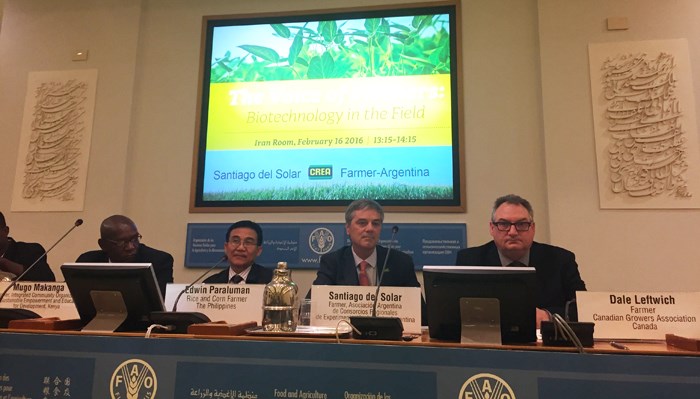“The audience reaction was actually a bit muted, but very positive. We had no negative comments at all. The panel was very popular and several people came up to us later to talk to us and express their support.”
— Dale Leftwich
Esterhazy farmer Dale Leftwich had an interesting opportunity recently, to speak at a world symposium on food production.
“The United Nations Food and Agriculture Organization (FAO) has previously held a couple of symposiums to discuss how we will feed the growing world population.” explained Leftwich, who is also a Director with SaskCanola.
But the most recent event held in Italy broadened the scope of the discussion, said Leftwich.
“These meetings have been intended to increase production on smallholder farms, but have not included how modern biotechnology could play a part,” he said. “Some groups did not want to include this type of innovation.
“This Biotechnology Symposium was organized with the express purpose of making sure that all of the tools would be available to make sure that farmers can feed the world. For this reason, this meeting was the first of its kind to include non-governmental organizations as well as academics, government and business representatives …
“The purpose of the symposium was to provide a forum for discussion about how to make sure farmers would be able to feed the growing world population. There are policies that (some) governments have implemented that have restricted production and restricted trade. It was very important to have a voice in future policy developments that will affect farmers.”
Obviously GM technology is a big part of the canola sector, and that was how Leftwich became part of the international event.
“I sit on the board of The Canadian Canola Growers (CCGA),” he explained. The CCGA represents 43,000 Canadian farmers nationally and internationally. “Because we export more than 90 per cent of what we grow it is important that governments do not put up more artificial barriers that are not based on scientific evidence. The CCGA decided that it was important to have our point of view presented in this forum and that we could also help provide a platform for other farm voices.
“I was chosen by the CCGA to represent the farmer’s voice.”
Leftwich said the symposium did give producers a voice, albeit a somewhat short one.
“We had five farmers take part in the panel. In addition to me, we had farmers from Argentina, the Philippines, from Kenya and Ghana,” he said.
So what was the message Leftwich shared?
“My particular presentation focused on three points,” he explained.
• That by allowing us to reduce tillage, biotechnology is good for the environment.
• That farmers need to be able to make decisions for themselves about how they farm and
• That we include everyone in the discussion about how food is produced.
“This side event took place during an extended lunch break and we each had only seven-minutes to make our points. What is interesting is that it was really the only part of the conference set aside for farm voices.
“In the plenary there were different individuals that got up at different times and said they spoke for 100 million or 200 million farmers, but ours was the only place on the agenda with the specific intention of having farmers speak for themselves.”
The reaction to Leftwich’s presentation may not have been as exuberant as he would have desired, but it was still a positive one.
“The audience reaction was actually a bit muted, but very positive,” he said. “We had no negative comments at all. “The panel was very popular and several people came up to us later to talk to us and express their support.”
And there were not a lot of questions either.
“There was really only time for one question and it was ‘How do farmers tell their stories and engage the public’,” said Leftwich.
“In answer I mentioned the documentary License to Farm (featured in a Yorkton This Week story Feb. 10), and said we are not trying to persuade people, but instead, talk with people. Each of the farmers had their own response as to what should be next.”
Overall, Leftwich said the event in Italy was a whirlwind of information.
“It was a very busy conference with people attending from all over the world,” he said. “The groups representing the African farmers were very pleased and we also received very positive responses from the American and Canadian contingents.”
The forum was webcast and can still be seen at: http://www.nytimes.com/2016/02/22/opinion/cranks-on-top.html?ref=opinion



